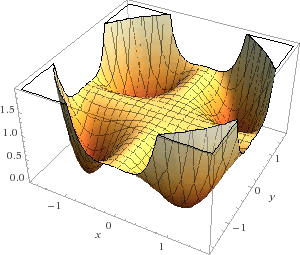Positive polynomials and squares
by John from John D. Cook on (#1JTFX)
If a real polynomial in one variable is a sum of squares, it obviously cannot be negative. For example, the polynomial
p(x) = (x2 - 3)2 + (x + 7)2
is obviously never negative for real values of x. What about the converse: If a real polynomial is never negative, is it a sum of squares? Yes, indeed it is.
What about polynomials in two variables? There the answer is no. David Hilbert (1862-1943) knew that there must be positive polynomials that are not a sum of squares, but no one produced a specific example until Theodove Motzkin in 1967. His polynomial
p(x, y) = 1 - 3x2y2 + x2y4 + x4y2
is never negative but cannot be written as a sum of any number of squares. Here's a plot:

Source: Single Digits